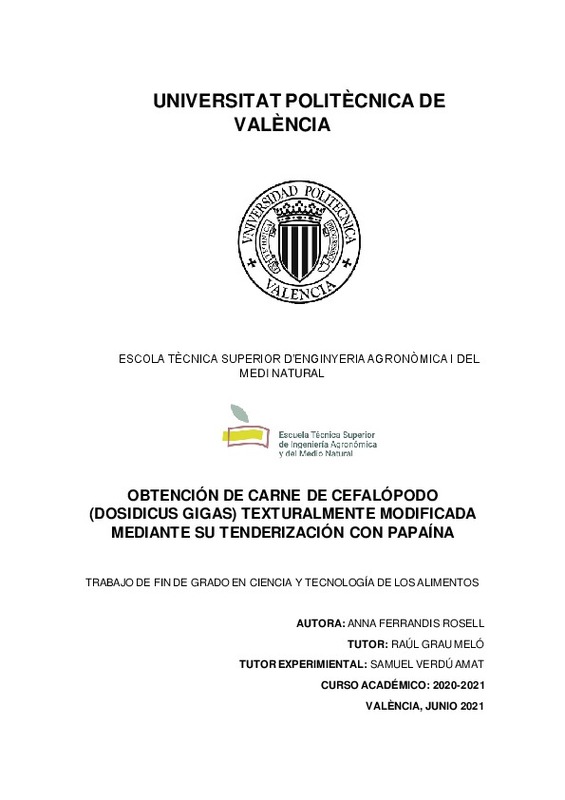|
Resumen:
|
[ES] El deterioro de las funciones masticatorias o de deglución es común en algunos grupos de personas, como en los ancianos, y afecta sus percepciones y elecciones de alimentos y su capacidad para comer. Pero este problema ...[+]
[ES] El deterioro de las funciones masticatorias o de deglución es común en algunos grupos de personas, como en los ancianos, y afecta sus percepciones y elecciones de alimentos y su capacidad para comer. Pero este problema también está presente en segmentos poblacionales, que, por ser más minoritarios, no dejan de ser importantes como aquellos que presentan ciertos trastornos neurológicos o del sistema nervioso provocados por distintas enfermedades (esclerosis múltiple, párkinson, cáncer, accidentes cerebrovasculares, etc.).
Es por ello que en el presente trabajo se ha evaluado la tenderización de la carne del calamar gigante (Dosidicus gigas) mediante la aplicación del enzima proteolítico (Papaína). Esta carne es una buena fuente de nutrientes y contiene compuestos como proteínas, ácidos grasos insaturados, vitaminas A, B y D, aminoácidos esenciales y otras biomoléculas importantes. Sin embargo, tiene una consistencia dura y pegajosa y es difícil ablandarlo, incluso después del almacenamiento y el calentamiento.
Para llevarlo a cabo, se utilizaron porciones congeladas comerciales de pota (Dosidicus gigas) dado que estas presentan formas más o menos regulares que, posteriormente. se cortaron en porciones de aproximadamente 1.5 x 1.5 x 3 cm. Las muestras fueron inoculadas con una solución (5% p / v) de enzima papaína (30 000 U / mg) (Biocon, Les Franqueses del Vallés, España) mediante una secuencia de inyecciones de 0.1 mL cada 0.5 cm. Se evaluaron dos temperaturas diferentes de cocción en agua (65 y 85 oC) a 0, 1, 3, 7, 10, 12, 15 y 20 minutos, así como el efecto de un masajeado. El efecto de la aplicación del enzima, el binomio tiempo - temperatura, así como del masajeado se realizó mediante análisis instrumentales (textura (TPA), imagen (color) y sensoriales (textura y apreciación visual)).
Los resultados obtenidos mostraron como el pretratamiento con enzima de la carne de pota (Dosidicus gigas) durante 24 horas en refrigeración, previo a su cocción, con la finalidad de reblandecer esta, no es un método eficaz. En cambio, evidenciaron como la actividad del enzima durante la etapa de cocción es la suficiente como para reblandecer la pota hasta tal punto que llega a perder su integridad, siendo el binomio tiempo ¿ temperatura influyente. A tal efecto, tanto las muestras tratadas a 65 como a 85 ºC alcanzaron el mínimo valor de dureza a los 15 minutos de cocción, si bien los catadores evaluaron las cocinadas a 65 ºC como las más blandas, y las cocinadas a 85 ªC como las más parecidas en aspecto a muestras control.
Estos resultados han sentado bases para nuevos estudios con la finalidad de desarrollar productos con textura modificada a partir de alimentos sólidos, apropiados para individuos con trastornos alimenticios o dificultades relacionadas con la masticación y deglución de los alimentos.
[-]
[EN] Impaired masticatory or swallowing functions are common in some groups of people, such as the elderly, and affect their perceptions and choices of food and their ability to eat. But this problem is also present in ...[+]
[EN] Impaired masticatory or swallowing functions are common in some groups of people, such as the elderly, and affect their perceptions and choices of food and their ability to eat. But this problem is also present in segments of the population which, although they are in the minority, are nonetheless important, such as those with certain neurological or nervous system disorders caused by various diseases (multiple sclerosis, Parkinson's disease, cancer, stroke, etc.).
This is why in the present work it has been evaluated the tenderisation of giant squid (Dosidicus gigas) meat by the application of the proteolytic enzyme (papain). This meat is a good source of nutrients and contains compounds such as proteins, unsaturated fatty acids, vitamins A, B and D, essential amino acids and other important biomolecules. However, it has a hard and sticky consistency and is difficult to tenderise, even after storage and heating.
To do this, commercial frozen portions of squid (Dosidicus gigas) were used, as they have more or less regular shapes, which were then cut into portions of approximately 1.5 x 1.5 x 3 cm. The samples were inoculated with a solution (5% w / v) of papain enzyme (30 000 U/mg) (Biocon, Les Franqueses del Vallés, Spain) by a sequence of 0.1 mL injections every 0.5 cm. Two different water cooking temperatures (65 and 85 ºC) were evaluated at 0, 1, 3, 7, 10, 12, 15 and 20 minutes, as well as the effect of massaging. The effect of the enzyme application, the time-temperature binomial, as well as the effect of massaging were analysed by instrumental (texture (TPA), image (colour) and sensory (texture and visual appreciation) analyses.)
The results obtained showed that pre-treatment of Jumbo Squid (Dosidicus gigas) meat with enzyme for 24 hours under refrigeration, prior to boiling, in order to soften it, is not an effective method. On the other hand, the results showed that the enzyme activity during the boiling stage is sufficient to soften the squid to such an extent that it loses its integrity, with the time-temperature combination being influential. To this effect, both 65 and 85 ºC samples reached the minimum hardness value after 15 minutes of cooking, although the tasters evaluated those cooked at 65 ºC as the softest, and those cooked at 85 ºC as the most similar in appearance to control samples.
These results have laid the groundwork for further studies to develop texture-modified products from solid foods, suitable for individuals with eating disorders or difficulties related to chewing and swallowing food.
[-]
|







